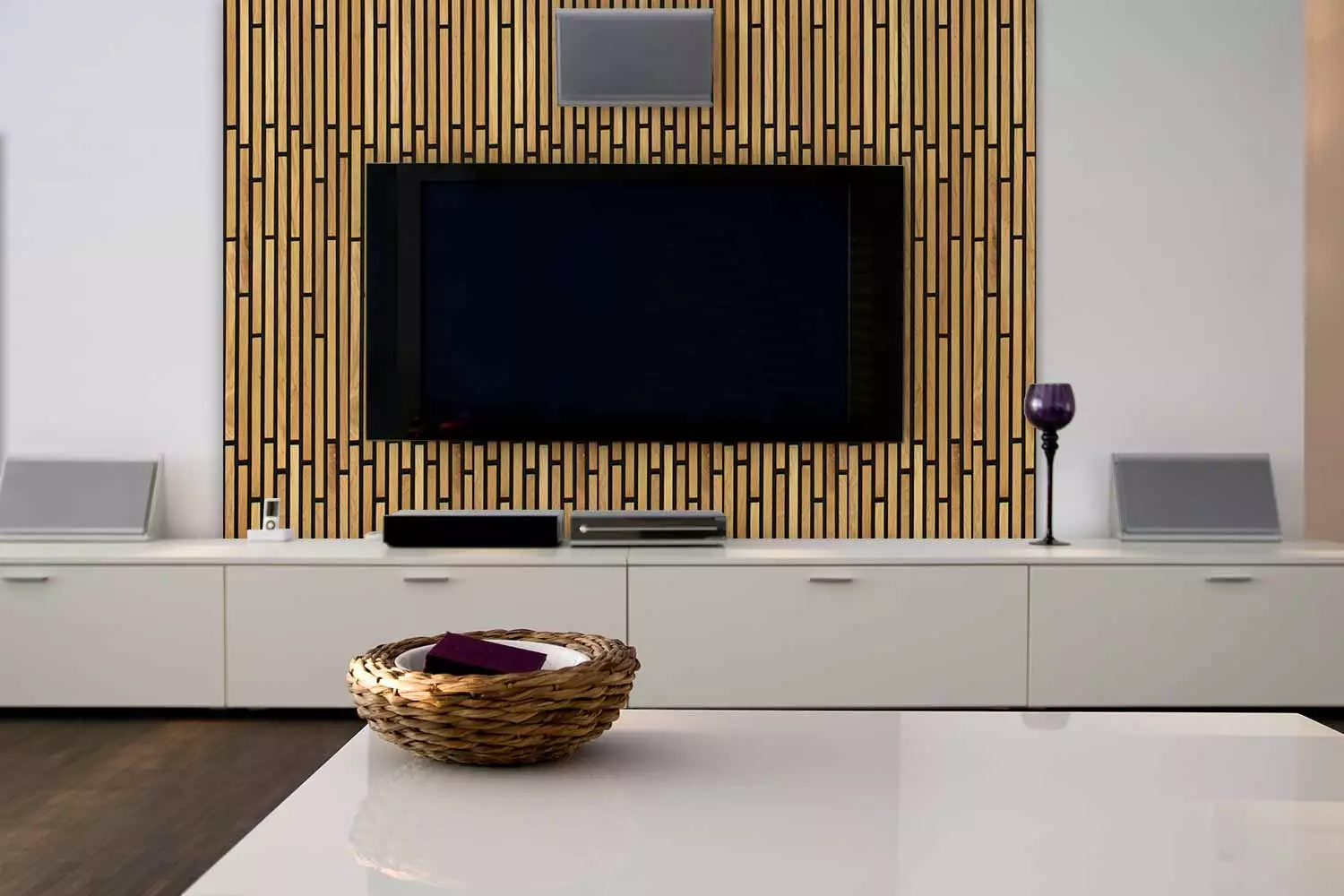The ultimate guide to acoustic panels made from wooden slats
Soundproof elegance for your room Introduction: Welcome to our comprehensive guide to acoustic panels made from wooden slats. In this guide, you will learn everything you need to know about the selection, installation and maintenance of these unique sound-absorbing elements, which not only provide acoustic improvements but are also an aesthetic enhancement for any room.With the knowledge gained from this guide, you will be ideally equipped to improve the acoustic quality of your room with elegant wooden slat acoustic panels. Enjoy the sonorous elegance and aesthetic benefits of these special sound-absorbing elements in your personal environment.
Table of contents:
Chapter 1: Wooden slats in room acoustics
- Explanation of the acoustic properties of wooden slats and why they are an effective solution for sound absorption.
- Presentation of the different types of wood and their specific acoustic characteristics.
Chapter 2: Tools and safety
- Overview of the different types of acoustic panels that use wood slats, including wall panels, ceiling sails and freestanding panels.
- Emphasizing the versatility of wood slats in the design of sound-absorbing elements
Chapter 3: Choosing the right wood louvre panels
- Guide to determining the need for acoustic enhancements in your space, taking into account the special atmosphere that wood slats can create.
- Tips for selecting wood species, finishes and designs that match your room aesthetic.
Chapter 4: Installing wood slat acoustic panels
- Step-by-step instructions on how to correctly install wood slat panels on walls, ceilings or as free-standing elements.
- Practical tips for taking structural conditions into account and ensuring stable fastening.
Chapter 5: Wooden slats and room design
- Explanation of how wooden slats not only offer acoustic improvements, but can also serve as design elements.
- Inspiration for integrating wooden slats into different room concepts and furnishing styles.
Chapter 6: Care and maintenance of wooden slats
- Advice on regular cleaning and care of wooden slats to preserve their beauty and effectiveness over time.
- Advice on avoiding exposure to moisture and other potential damage.
Chapter 7: Creative applications of wooden slats
- Ideas for DIY projects and creative customizations of wood slat acoustic panels to bring a personal touch to your space.
- Suggestions for artistically designing wood slats as part of your room decor.

Chapter 1: Wooden slats in room acoustics
The importance of room acoustics is far-reaching and has a significant influence on our well-being, our concentration and the overall impression of a room. Wooden slat acoustic panels offer a unique opportunity not only to achieve acoustic improvements, but also to bring a warm, natural aesthetic into the room.
1.1 The acoustic properties of wooden slats
Wooden slats are characterized by their natural ability to absorb sound. In contrast to smooth surfaces, the porous material not only reflects sound but also absorbs it effectively. We look at why wooden slats are an ideal choice for creating balanced room acoustics.
1.2 Versatility of wood types and surface treatments
In this section, you will learn more about the variety of wood species available and how different surface treatments can influence not only the aesthetic effect but also the acoustic properties. Choosing the right type of wood plays a key role in shaping the sound character of a room.
1.3 Natural aesthetics and well-being
Wooden slats give rooms a natural, warm atmosphere. We explain how this natural aesthetic is not only visually appealing, but can also have a positive effect on the well-being and mood of the people in the room.
1.4 Wooden slats in harmony with the environment
Using wood as a sustainable material for acoustic panels also emphasizes the environmental aspect. In this section, you will learn why wooden slats not only offer acoustic benefits, but are also an environmentally friendly choice for interior design.
1.5 Areas of use and possible applications
Wooden slat acoustic panels are used in a wide variety of environments. From living spaces to offices and public facilities, we look at the different areas of application and how wooden slats can be flexibly integrated into various room concepts.
With an understanding of the acoustic properties, the versatility of wood species and the natural aesthetics of wooden slats, you will be well equipped to utilize the possibilities of these sound-absorbing elements in your interior design.
Chapter 2: Types of acoustic panels with wooden slats
Wooden slat acoustic panels offer a wide range of design options to improve room acoustics while creating an aesthetically pleasing atmosphere. In this chapter, we explore the different types of acoustic panels with wooden slats and how they can be used specifically in different room concepts.
2.1 Wall panels with wooden slats
Wall panels are one of the most popular applications of wooden slats in room acoustics. We look at different designs and installation options to minimize echoes and make the most of the sound-absorbing properties of wooden slats.
2.2 Ceiling sails made from wooden slats
Ceiling sails offer an effective solution for reducing reverberation in rooms. This section explains the installation and creative ways of arranging wooden slat ceiling sails, which are not only acoustically effective but also enhance the ceiling design.
2.3 Freestanding panels and room dividers
Find out how freestanding wooden louvre panels can act as acoustic room dividers. We look at their flexibility in application and how they can not only absorb sound, but also contribute to room design as decorative elements.
2.4 Combining wooden slats with other materials
Dive into the world of hybrid panels that combine wooden slats with other materials. We explain how the integration of metal, fabrics or other elements can further enhance the aesthetic and acoustic qualities of the panels.
2.5 Customized solutions and design options
Discover the possibilities of bespoke wood slat panels that are specifically tailored to the individual needs of a room. We also look at innovative design variants that go beyond traditional shapes and give rooms a unique identity.The variety of acoustic panels with wooden slats makes it possible to specifically address the acoustic requirements of different rooms while creating an aesthetically pleasing interior design. Use the findings in this chapter to select the right type of wooden slat acoustic panels for your needs.
Chapter 3: Choosing the right wood lamella panels
Now that you have learned about the different types of acoustic panels with wooden slats, it is crucial to choose the right panels for the specific requirements of your room. This chapter provides you with practical instructions on how to proceed in a targeted manner to achieve optimum acoustic improvements.
3.1 Determining the requirements for acoustic improvements
Start with a thorough analysis of your room to identify the specific acoustic challenges. Learn how to recognize echoes, reverberation and sound reflections to accurately determine the need for acoustic panels.
3.2 Selecting the right panel type
Based on the identified acoustic challenges, you will find out which panel type is most suitable. Be it wall panels to minimize echoes, ceiling sails to reduce reverberation or free-standing panels for targeted sound absorption - choose the right type according to the needs of your room.
3.3 Selecting materials according to acoustic properties
Understand how different materials affect the acoustic performance of panels. We explain which types of wood are particularly effective at absorbing sound and how different surface treatments can affect acoustic properties.
3.4 Considering the size and shape of the room
The size and shape of your room play a crucial role in the selection of acoustic panels. This section provides guidance on how to take room geometry into account when making your decision to ensure even sound absorption throughout the room.
3.5 Aesthetics and design
Acoustic panels should not only be functional, but also aesthetically pleasing. Find out how you can integrate the design aspects of your room layout into your choice of panels. From color and textile options to custom designs, discover how wood slat panels can add stylish accents.Chapter 4: Installing wooden slat acoustic panels
Choosing the optimal wood slat panels is an important step, but installing them correctly plays a crucial role in their effectiveness. In this chapter, you will learn how to install your acoustic solutions correctly to achieve the best possible acoustic results.
4.1 Preparing and planning the installation
Start with careful preparation and planning to ensure a smooth installation process. We explain how to determine the optimal installation location, take structural conditions into account and prepare all the necessary tools and materials.
4.2 Wall installation of wooden slat panels
4.3 Installing wooden slat ceiling panels
Immerse yourself in the world of ceiling sails and learn how to install wooden slats effectively on the ceiling. This section provides practical tips on fixing technology and optimum positioning for targeted reduction of reverberation.
4.4 Securely positioning free-standing panels and room dividers
Learn how to safely position freestanding wooden slat panels to act not only as sound-absorbing elements, but also as decorative room dividers. We look at different methods to ensure stable positioning.
4.5 Optimal placement for maximum efficiency
Get recommendations on the optimal placement of your wooden slat panels. From considering room size to arranging multiple panels for even sound absorption, learn how to achieve the best possible acoustic results.4.6 Integration into the room design and architectural aspects
Wooden slat acoustic panels can not only impress acoustically, but also aesthetically. In this section, you will learn how to cleverly integrate the installation into the interior design and enhance the architectural dynamics of the room. The correct installation of your wooden slat acoustic panels is crucial for their effectiveness and aesthetic integration into the room. Use the practical instructions in this chapter to successfully implement your room acoustics project and create a room that not only sounds good, but is also visually appealing.
Chapter 5: Care and maintenance of wooden slat acoustic panels
After successful installation, it is important to ensure the longevity and effectiveness of your wooden slat acoustic panels. In this chapter, you will learn how to care for and maintain your panels to preserve their aesthetic presence and acoustic performance over time.
5.1 Regular cleaning and care
Get instructions on how to regularly clean your wooden slats to remove dust and dirt. We explain the best practices to preserve the natural beauty of the wood surfaces while keeping the acoustic pores clear.
5.2 Care of textile coverings and surfaces
If your wooden slats have textile coverings or special surfaces, we offer specific advice on how to care for these materials. Find out how to remove stains and keep the fabrics in optimum condition.
5.3 Protection against moisture and mold
Wood is sensitive to moisture. This section gives you tips on how to protect your wooden slats from moisture to prevent possible mold growth. We also look at suitable types of wood and surface treatments that are more resistant to the effects of moisture.
5.4 Repairs and maintenance
Learn basic repair techniques for damaged wood slats. From minor scratches to fabric tears, learn how to repair minor damage to extend the life of your panels.
5.5 Updating and design customization
Discover how you can renew your wooden slat acoustic panels with simple design adjustments and updates. Suggestions for changing colors and patterns and integrating new design elements are presented to vary the look of your acoustic solutions.5.6 Adjusting the lighting for optimum effect
Learn how to adjust the lighting in your room to optimize the aesthetic impact of your wood slat panels. Tips on light positioning and selection of lighting elements will help to enhance the visual presence of your panels. By implementing the advice in this chapter, you will ensure that your wooden slat acoustic panels not only remain acoustically effective, but also retain their aesthetic appeal in the long term.
Chapter 6: Integrating wooden slat acoustic panels into the interior design
The harmonious integration of wooden slat acoustic panels into the overall design of a room not only contributes to sound optimization, but also gives the room an aesthetic quality. In this chapter, you will learn how to integrate your wooden slats seamlessly into the room design to create a balanced and appealing atmosphere.
6.1 Color coordination and harmony
Get tips on how to color coordinate your wooden slats with the rest of your interior design. From complementary hues to contrasting accents, learn how colors can influence the visual impact of your panels and the room.
6.2 Matching the style to the character of the room
Every room has its own character. Learn how you can adapt the style of your wooden slats to the individual character of your room. We look at different furnishing styles and how wooden slats can be integrated into modern, classic or minimalist designs.
6.3 Accentuating room details
Discover how you can emphasize certain room details with wooden slats. Whether architectural elements, niches or special pieces of furniture - we show how wooden slats as a design element can help to draw the focus to certain areas.
6.4 Integration into various room functions
Consider the versatile adaptability of wooden slats to different room functions. Whether in the living room, office or bedroom - we provide tips on how to place the acoustic panels according to the specific requirements and activities in the room.
6.5 Combination with furniture and furnishing elements
Find out how wooden slats can be harmoniously combined with furniture and other furnishing elements. From wooden furniture to modern design pieces - we provide tips for creating a coherent interior in which the wooden slats are perfectly integrated.6.6 Lighting as a design element
Delve into the world of lighting and learn how it can help to enhance the aesthetic impact of your wooden slats. We look at different light sources and their positioning in order to optimally stage the panels. With the knowledge gained in this chapter, you will be able to use your wooden slat acoustic panels not only as sound-absorbing elements, but also as a design highlight that takes interior design to a new level.
Chapter 7: Combination with other acoustic solutions
The integration of wooden slat acoustic panels into your room design can be further optimized by combining them with other acoustic solutions. In this chapter, you will learn how to effectively combine wood lamella acoustic panels with other elements to achieve a comprehensive acoustic improvement.
7.1 Combination with carpets and curtains
Find out how carpets and curtains can help absorb sound and improve room acoustics in combination with wooden slats. We highlight the synergistic effects of these elements and give practical tips on choosing suitable materials and designs.
7.2 Furniture as acoustic elements
Discover the possibilities of integrating acoustic properties into furniture. This section explains how certain furniture concepts not only serve as aesthetic elements, but can also help to increase sound absorption in your room.
7.3 Acoustic ceiling and floor solutions
Delve into the world of acoustic ceiling and floor solutions and understand how they can enhance the overall effect when combined with wooden slat acoustic panels. This section provides suggestions for the selection and integration of materials for a comprehensive acoustic experience.
7.4 Room acoustics in offices and commercial spaces
Find out how wooden slat acoustic panels can be combined with other acoustic solutions such as sound-absorbing ceilings and partitions in offices and commercial spaces. Practical tips will help you to create an optimal working environment.
7.5 Acoustic optimization in home cinemas
Take a look at special approaches for acoustic optimization in home cinemas. We show you how to combine wooden slat acoustic panels with special acoustic materials, curtains and floor coverings to create an immersive listening experience.
7.6 Considering plants and acoustics
Learn how plants can serve not only as decorative elements, but also as acoustic enhancements. Tips on selecting plants and their placement in conjunction with wood slat acoustic panels are presented to maximize sound-absorbing effects. The combination of different acoustic solutions enables comprehensive optimization of room acoustics. Use the findings in this chapter to create a balanced interplay of different elements and design an optimal acoustic environment.
 Expert advice +49 39 349 / 94 19 50
Expert advice +49 39 349 / 94 19 50
 eMail:
eMail: 


